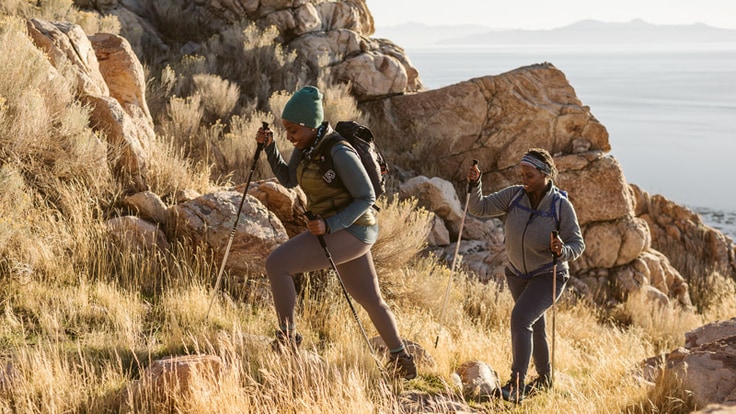Mountain hiking for beginners can be an exciting and challenging adventure that allows you to connect with nature and challenge yourself physically. This article will provide you with essential tips and advice to help you get started on your mountain hiking journey.
Whether you are a complete novice or have some hiking experience, this guide will cover everything from selecting the right gear and clothing to preparing physically and mentally for the hike. By following these tips, you can ensure a safe and enjoyable mountain hiking experience.
So, let’s lace up our boots, hit the trails, and embark on this thrilling adventure together!

Credit: www.rei.com
Understanding The Basics
So, you’ve decided to embark on a hiking adventure and dive into the world of mountain hiking. Congratulations! Mountain hiking can be an incredible experience, providing a unique connection with nature and an opportunity to challenge yourself physically. But before you start planning your first hike, it’s important to understand the basics.
In this section, we’ll cover the key points you need to know about choosing the right trail, essential gear and equipment, and physical preparation for hiking.
Choosing The Right Trail
Picking the right trail is crucial for ensuring a successful and enjoyable mountain hiking experience. Consider the following points when selecting your trail:
- Difficulty level: As a beginner, it’s important to choose a trail that matches your fitness level and hiking experience. Look for trails labeled as “beginner-friendly” or with easy ratings.
- Distance and duration: Consider the length of the trail and how long you’re willing to hike. Start with shorter distances and gradually increase as you gain more experience.
- Terrain and elevation: Take into account the type of terrain and the elevation gain of the trail. Steeper slopes and higher altitudes can add an extra challenge, so it’s advisable to start with more moderate trails.
- Scenery and points of interest: Think about the kind of scenery you enjoy and any specific points of interest you’d like to see along the way. This can greatly enhance your overall hiking experience.
Essential Gear And Equipment
Having the right gear and equipment will ensure your comfort and safety during the hike. Here are some essentials to consider:
- Hiking boots: Invest in a good pair of hiking boots that provide ankle support and have a sturdy sole for traction. Proper footwear is crucial for preventing injuries.
- Clothing layers: Dress in layers to adapt to changing weather conditions. Opt for moisture-wicking and breathable fabrics that will keep you dry and comfortable.
- Backpack: Choose a backpack that is appropriate for the length of your hike. It should have enough capacity to carry water, snacks, extra clothing layers, and other essentials.
- Navigation tools: Carry a map, compass, or gps device to aid you in navigating the trail. Familiarize yourself with how to use them before your hike.
- First aid kit: It’s essential to have a basic first aid kit with items such as band-aids, antibiotic ointment, pain relievers, and any personal medications.
Physical Preparation For Hiking
To fully enjoy your mountain hiking experience, it’s important to prepare your body physically. Here are some key points to keep in mind:
- Cardiovascular fitness: Hiking involves exertion and endurance. Engage in regular cardiovascular exercises such as walking, jogging, or cycling to improve your overall fitness levels.
- Strength and endurance training: Focus on strength exercises targeting your legs, core, and upper body to build the necessary muscular endurance required for hiking.
- Flexibility and stretching: Perform stretching exercises, yoga, or pilates to enhance flexibility and prevent muscle strains during the hike.
- Gradual progression: Start with shorter hikes and gradually increase your distance and difficulty level. This will allow your body to adapt and minimize the risk of injuries.
By understanding the basics of mountain hiking, including choosing the right trail, having essential gear and equipment, and preparing yourself physically, you’ll be well on your way to a successful and enjoyable hiking adventure. So, lace up your boots, pack your backpack, and get ready to explore the wonders of the mountains!
Safety Measures And Precautions
Mountain Hiking For Beginners
Hiking in the mountains can be an exhilarating and rewarding experience. However, it is important for beginners to be aware of certain safety measures and precautions. By taking these precautions, you can ensure a safer and more enjoyable hiking adventure.
In this section, we will discuss key safety measures and precautions, including assessing weather conditions, navigating mountain terrain safely, and first aid and emergency preparedness.
Assessing Weather Conditions
Before embarking on a mountain hiking trip, it is crucial to assess the weather conditions. The weather can change rapidly in the mountains, and being prepared can make a significant difference. Consider the following points:
- Check the weather forecast before you start your hike, and continue to monitor it throughout the trip.
- Be mindful of signs of changing weather conditions, such as a sudden drop in temperature, strong winds, or darkening skies.
- Avoid hiking during severe weather conditions, including thunderstorms, heavy rain, or high winds.
- Familiarize yourself with the signs of hypothermia, heat stroke, and dehydration, and take appropriate measures to prevent them.
Navigating Mountain Terrain Safely
Mountain terrain can be challenging and unpredictable, especially for beginners. To ensure your safety while hiking, keep the following tips in mind:
- Choose trails that are suitable for your skill level and experience. Start with easier hikes and gradually progress to more difficult ones.
- Always stay on marked trails and avoid taking shortcuts. Straying off the trail can lead to injury or becoming lost.
- Pay attention to the trail markers and follow any established signs or symbols.
- Slow down and take your time when hiking uphill or downhill, especially on steep or slippery sections.
- Use trekking poles for added stability and to reduce strain on your joints.
- Be cautious when crossing rivers or streams, and use caution on loose or unstable terrain.
First Aid And Emergency Preparedness
Being prepared for emergencies is essential when hiking in the mountains. Here are some key points to consider:
- Carry a first aid kit with essential supplies such as bandages, antiseptic ointment, pain relievers, and blister care products.
- Learn basic first aid skills, including treating common hiking injuries such as sprains, cuts, and insect bites.
- Familiarize yourself with the symptoms and treatment of altitude sickness, a potentially serious condition that can occur at high elevations.
- Carry a whistle, flashlight, and extra batteries for signaling in case of emergencies.
- Let someone know your hiking plans, including the trail you will be taking and your estimated return time.
- Familiarize yourself with the area’s emergency contact numbers and the nearest medical facilities.
By taking these safety measures and precautions, you can better ensure your well-being while mountain hiking. Remember, it is always better to be safe than sorry. Enjoy your hiking adventure and stay safe!
Trail Etiquette And Leave No Trace Principles
Respecting Nature And Wildlife
When venturing out on a mountain hike, it’s crucial to show respect for the natural environment and the wildlife that calls it home. Here are some key points to remember:
- Stay on the designated trails: Straying from the marked trails can disrupt delicate ecosystems and cause soil erosion. It’s important to stick to the designated paths to minimize our impact on the environment.
- Pack out what you pack in: As responsible hikers, we should always carry a trash bag and make sure to pick up and dispose of any litter we come across. This helps preserve the beauty of the trail and prevents animals from consuming harmful substances.
- Respect wildlife from a distance: It’s exciting to encounter wildlife during a hike, but we should never approach or try to touch them. Respecting their space ensures their safety and allows them to carry on with their natural behaviors undisturbed.
- Keep noise levels down: Excessive noise can disrupt wildlife and create unnecessary stress. By maintaining a calm and quiet demeanor on the trails, we can enjoy the sounds of nature and have a greater chance of wildlife sightings.
- Leave flowers and plants untouched: While it may be tempting to pluck flowers or take home a souvenir from the trail, it’s important to remember that these organisms play a vital role in the ecosystem. Leaving them undisturbed ensures their continued growth and preservation.
Leave No Trace Principles
Hiking with a “leave no trace” mindset is essential for preserving the natural beauty of the mountains. Here are the key principles to follow:
- Plan ahead and prepare: Research the trail before your hike, pack the necessary gear, and be aware of any potential environmental concerns or regulations. Proper preparation minimizes the chances of encountering unexpected challenges and helps you leave minimal impact.
- Travel and camp on durable surfaces: Stick to established trails and camping areas to avoid damaging fragile vegetation. If setting up camp, choose a spot that is already impacted by previous campers, such as an established campsite, to minimize further damage.
- Dispose of waste properly: Be mindful of your waste and dispose of it in the correct manner. Pack out all trash, including food waste, and use designated restrooms or facilities when available.
- Leave what you find: It can be tempting to pick up interesting rocks or take a piece of nature home, but it’s best to leave natural objects as you found them. This ensures that other hikers can enjoy the same untouched beauty.
- Minimize campfire impacts: If building a campfire, use existing fire rings and keep the fire small. Make sure to completely extinguish the fire before leaving the area.
- Respect wildlife and be considerate of other visitors: Give wildlife their space and observe from a distance. Yield to other hikers on the trail and be courteous when passing. By showing respect to both wildlife and fellow hikers, we can enhance everyone’s outdoor experience.
By following these trail etiquette guidelines and leave no trace principles, we can enjoy the beauty of mountain hiking while minimizing our impact on the environment. Let’s embrace our role as responsible hikers and ensure that future generations will also have the opportunity to explore these stunning landscapes.
Conclusion
Mountain hiking is an exhilarating adventure that offers numerous benefits for beginners. By exploring the great outdoors, you can cultivate a stronger mind and body. The physical demands of hiking provide an excellent workout, helping to improve cardiovascular health and build muscle strength.
Additionally, being in nature can reduce stress levels and improve overall mental well-being. It offers a sense of peace, tranquility, and a chance to disconnect from the busyness of everyday life. As a beginner, it’s essential to start with smaller hikes and gradually work your way up to more challenging trails.
Remember to always be prepared with the right gear, stay hydrated, and be mindful of your surroundings. With every step you take, you’ll gain confidence and experience the wonders of the mountains. So lace up your hiking boots, embrace the beauty of nature, and embark on your mountain hiking journey.
Happy trails!




